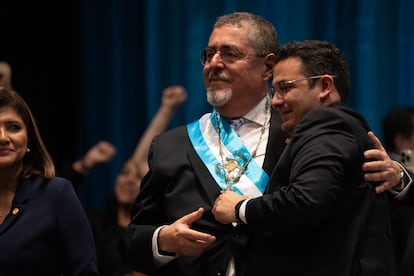US sanctions Alejandro Giammattei for corruption three days after he leaves Guatemalan presidency
Washington said ‘credible information’ indicates the former president ‘accepted bribes in exchange for the performance of his public functions during his tenure’
The U.S. Department of State (DOS) on Wednesday sanctioned former Guatemalan president Alejandro Giammattei and banned him from entering the country for “his involvement in significant acts of corruption.” According to DOS spokesman Matthew Miller, the U.S. government has “credible information” that indicates the former president “accepted bribes in exchange for the performance of his public functions during his tenure.”
The announcement comes three days after Giammattei left power to be replaced by the winner of the August elections, Bernardo Arévalo, after a complicated transition period. The new president has argued that other branches of government tried to prevent his investiture. Washington, which has closely followed the crisis, has also played an active role in condemning those who perpetuate corruption in Guatemala, which in recent years has seen an increase in authoritarianism and a corrosion of its institutions.
“Over the past three years, we have taken steps to impose visa restrictions or sanctions on nearly 400 individuals, including public officials, private sector representatives, and their family members for engaging in corrupt activities or undermining democracy or the rule of law in Guatemala,” Miller said in the statement. ”Corruption weakens the rule of law and democratic institutions, enables impunity, fuels irregular migration, hampers economic prosperity, and curtails the ability of governments to respond effectively to their people’s needs.”
The ban on entry into the United States was imposed under the Magnitsky Act, which provides for sanctions against human rights violators and those involved in serious acts of corruption, and also extends to Giammattei’s children: Ana Marcela Dinorah, Alejandro Eduardo and Stefano Giammattei Cáceres. Earlier this week, Republican Senator Mike Lee said that immigration authorities at Miami International Airport had prevented one of the former president’s children from entering the country and had returned him to Guatemala, even though he had a visa to enter the United States.

CC orders repeat of congressional election
Guatemala’s Constitutional Court (CC) on Wednesday ordered a repeat of the election of the board of directors of Congress, after accepting a provisional appeal presented by the opposition. On Sunday, its presidency fell into the hands of a deputy from Arévalo’s ruling Seed Movement, Samuel Pérez, despite the party being the third force in Congress. According to the CC, its decision does not affect the appointment of the president and his vice-president.
The appeal was lodged by, among others, Congresswoman Sandra Jovel of the conservative party Valor, who was on another slate vying for the presidency of Congress that lost out to Pérez. A former Minister of Foreign Affairs, Jovel argues that several of the deputies on the board of directors belong to the Seed Movement, which is legally suspended and, therefore, cannot form part of the presidency or the commissions.
The suspension of the Seed Movement was imposed by order of criminal judge Fredy Orellana, who is investigating alleged “anomalies in the creation” of the political party five years ago. Orellana is also under U.S. sanctions for corruption and is one of the leading figures in the Guatemalan judiciary who have attempted to derail Arévalo’s investiture as president.
Sign up for our weekly newsletter to get more English-language news coverage from EL PAÍS USA Edition
Tu suscripción se está usando en otro dispositivo
¿Quieres añadir otro usuario a tu suscripción?
Si continúas leyendo en este dispositivo, no se podrá leer en el otro.
FlechaTu suscripción se está usando en otro dispositivo y solo puedes acceder a EL PAÍS desde un dispositivo a la vez.
Si quieres compartir tu cuenta, cambia tu suscripción a la modalidad Premium, así podrás añadir otro usuario. Cada uno accederá con su propia cuenta de email, lo que os permitirá personalizar vuestra experiencia en EL PAÍS.
¿Tienes una suscripción de empresa? Accede aquí para contratar más cuentas.
En el caso de no saber quién está usando tu cuenta, te recomendamos cambiar tu contraseña aquí.
Si decides continuar compartiendo tu cuenta, este mensaje se mostrará en tu dispositivo y en el de la otra persona que está usando tu cuenta de forma indefinida, afectando a tu experiencia de lectura. Puedes consultar aquí los términos y condiciones de la suscripción digital.









































